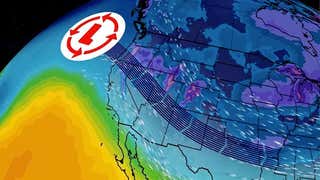

US
°C





A phenomenon known as sunglint causes an eerie shadow in the waters off Oman on April 11, 2017.
(NASA Earth Observatory)
A recent NASA satellite image showed an eerie, dark swath in the Arabian Sea off Oman's coast.Scientists say it was caused by a totally natural phenomenon known as a sunglint.
What appears to be something dark and sinister brewing in the Arabian Sea is actually a ray of light, NASA officials said.
In a natural-color image captured by NASA’s Moderate Resolution Imaging Spectroradiometer (MODIS), on the waters off Oman, according to a release.
The space agency in a satellite image.
(MORE:)
"If the ocean were as smooth as a mirror, a sequence of nearly perfect reflections of the sun would appear in a line along the track of the satellite’s orbit," said the NASA report. "Because the ocean is never perfectly smooth or calm, however, the sun’s reflection gets blurred as the light is scattered in all directions by waves."
This blurred reflection makes the ocean’s surface appear washed out, which is the sunglint region.
What makes this image of the Arabian Sea unique is that the bright area where the sunglint is seen is interrupted. According to NASA, the dark areas indicatewaters on the surface are being roughened by winds, blurring the sunglint and causing less light to shine back toward the satellite.
This type of phenomenon allows scientists to spot things such as wind patterns that aren't directly visible in natural-color images.
MORE ON WEATHER.COM: Top 100 Images Captured by NASA's Hubble Satellite
April 24 marks the 25th anniversary of the Hubble Telescope. To celebrate, NASA and the European Space Agency, which jointly run the telecope, released this image of the star cluster Westerlund 2. (NASA/ESA/Hubble Heritage Team/A. Nota/Westerlund 2 Science Team)












